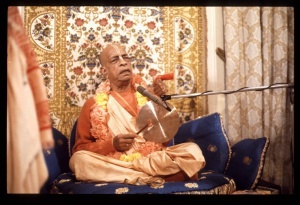CC Antya 1.170 (1975)

A.C. Bhaktivedanta Swami Prabhupada
Below is the 1996 edition text, ready to be substituted with the 1975 one using the compile form.
TEXT 170
- vidhur eti divā virūpatāṁ śata-patraṁ bata śarvarī-mukhe
- iti kena sadā śriyojjvalaṁ tulanām arhati mat-priyānanam
SYNONYMS
vidhuḥ—the moon; eti—becomes; divā—by daytime; virūpatām—faded away; śata-patram—he lotus flower; bata—alas; śarvarī-mukhe—in the beginning of evening; iti—thus; kena—with what; sadā—always; śriyā-ujjvalam—brilliant with beauty; tulanām—comparison; arhati—deserves; mat—of Me; priyā—of the dear one; ānanam—the face.
TRANSLATION
“‘Although the effulgence of the moon is brilliant initially at night, in the daytime it fades away. Similarly, although the lotus is beautiful during the daytime, at night it closes. But, O My friend, the face of My most dear Śrīmatī Rādhārāṇī is always bright and beautiful, both day and night. Therefore, to what can Her face be compared?’
PURPORT
This verse (Vidagdha-mādhava 5.20) is spoken by Śrī Kṛṣṇa to Madhumaṅgala.